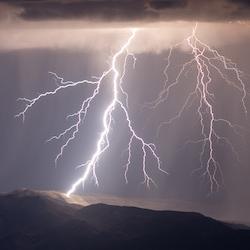Langmuir Laboratory for Atmospheric Research
 Langmuir Laboratory, built by New Mexico Tech in 1963, is located at an elevation
of 3,240 m (10,630 ft) in the Magdalena Mountains, 27 km (17 air miles) southwest
of the Socorro campus. The laboratory was named in honor of Dr. Irving Langmuir, Nobel
Prize winner, who participated in numerous experiments at Tech related to cloud physics
after the discovery of cloud seeding in 1946. Because of its location and unusual
climatic situation, the site provides unique opportunities for studies of thundercloud
mechanisms, lightning, and precipitation. Overnight living accommodations are available
for faculty and students working at the laboratory.
Langmuir Laboratory, built by New Mexico Tech in 1963, is located at an elevation
of 3,240 m (10,630 ft) in the Magdalena Mountains, 27 km (17 air miles) southwest
of the Socorro campus. The laboratory was named in honor of Dr. Irving Langmuir, Nobel
Prize winner, who participated in numerous experiments at Tech related to cloud physics
after the discovery of cloud seeding in 1946. Because of its location and unusual
climatic situation, the site provides unique opportunities for studies of thundercloud
mechanisms, lightning, and precipitation. Overnight living accommodations are available
for faculty and students working at the laboratory.
New Mexico Tech is situated close to the Magdalena Mountain Range, which provides both a unique meteorological situation for studying thunderstorms, and a clear dark site for astronomical telescopes. In order to take advantage of this, Congress has established 33,000 acres of the Cibola National Forest as the Langmuir Research Site.
New Mexico Tech operates the Langmuir Laboratory for Atmospheric Physics at an altitude of 10,000 feet in the research site. During the summer, isolated thunderstorms form directly over the site, and usually remain there during their entire life cycle. Thus, it is possible to study thunderstorms with instruments at a fixed location, which is much easier than using mobile instruments to study moving storms. Scientists from New Mexico Tech and from many institutions in the US and abroad study these thunderstorms using balloons, rockets, Doppler radar, aircraft, lighting instruments and ground-based electric field mills.